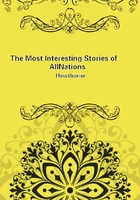
第25章 Andrew Lang(6)
His name, we read, when announced after his death, will astonish the world more than all the marvels of his life. He has been in England already (1743-17--?); he is a great unknown. Nobody can accuse him of anything dishonest or dishonorable. When he was here before we were all mad about music, and so he enchanted us with his violin. But Italy knows him as an expert in the plastic arts, and Germany admires in him amaster in chemical science. In France, where he was supposed to possess the secret of the transmutation of metals, the police for two years sought and failed to find any normal source of his opulence. A lady of forty-five once swallowed a whole bottle of his elixir. Nobody recognized her, for she had become a girl of sixteen without observing the transformation!
Saint-Germain is said to have remained in London but for a short period. Horace Walpole does not speak of him again, which is odd, but probably the Count did not again go into society. Our information, mainly from Von Gleichen, becomes very misty, a thing of surmises, really worthless. The Count is credited with a great part in the palace conspiracies of St. Petersburg; he lived at Berlin, and, under the name of Tzarogy, at the Court of the Margrave of Anspach. Then he went, they say, to Italy, and then north to the Landgrave Charles of Hesse, who dabbled in alchemy. Here he is said to have died about 1780-85, leaving his papers to the Landgrave but all is very vague after he disappeared from Paris in 1760. When next I meet Saint-Germain he is again at Paris, again mysteriously rich, again he rather disappears than dies, he calls himself Major Fraser, and the date is in the last years of Louis Philippe. My authority may be caviled at; it is that of the late ingenious Mr. Van Damme, who describes Major Fraser in a book on the characters of the Second Empire. He does not seem to have heard of Saint-Germain, whom he does not mention.
Major Fraser, "in spite of his English (sic) name, was decidedly not English, though he spoke the language." He was (like Saint- Germain) "one of the best dressed men of the period. . . . He lived alone, and never alluded to his parentage. He was always flush of money, though the sources of his income were a mystery to everyone." The French police vainly sought to detect the origin of Saint-Germain's supplies, opening his letters at the post-office. Major Fraser's knowledge of every civilized country at every period was marvelous, though he had very few books. "His memory was something prodigious. . . . Strange to say, he used often to hint that his was no mere book knowledge. "'Of course, it is perfectly ridiculous,'" he remarked, with a strange smile, "'but every now and then I feel as if this did not come to me from reading, but frompersonal experience. At times I become almost convinced that I lived with Nero, that I knew Dante personally, and so forth.'"[1] At the major's death not a letter was found giving a clew to his antecedents, and no money was discovered. DID he die? As in the case of Saint-Germain, no date is given. The author had an idea that the major was "an illegitimate son of some exalted person" of the period of Charles IV. and Ferdinand VII. of Spain.
[1] An Englishman in Paris, vol. i., pp. 130-133.London, 1892.
The author does not mention Saint-Germain, and may never have heard of him. If his account of Major Fraser is not mere romance, in that warrior we have the undying friend of Louis XV. and Madame de Pompadour. He had drunk at Medmenham with Jack Wilkes; as Riccio he had sung duets with the fairest of unhappy queens; he had extracted from Blanche de Bechamel the secret of Goby de Mouchy. As Pinto, he told much of his secret history to Mr. Thackeray, who says: "I am rather sorry to lose him after three little bits of Roundabout Papers."Did Saint-Germain really die in a palace of Prince Charles of Hesse about 1780-85? Did he, on the other hand, escape from the French prison where Grosley thought he saw him, during the French Revolution? Was he known to Lord Lytton about 1860? Was he then Major Fraser? Is he the mysterious Muscovite adviser of the Dalai Lama? Who knows? He is a will-o'-the-wisp of the memoir-writers of the eighteenth century. Whenever you think you have a chance of finding him in good authentic State papers, he gives you the slip; and if his existence were not vouched for by Horace Walpole, I should incline to deem him as Betsy Prig thought of Mrs. Harris.